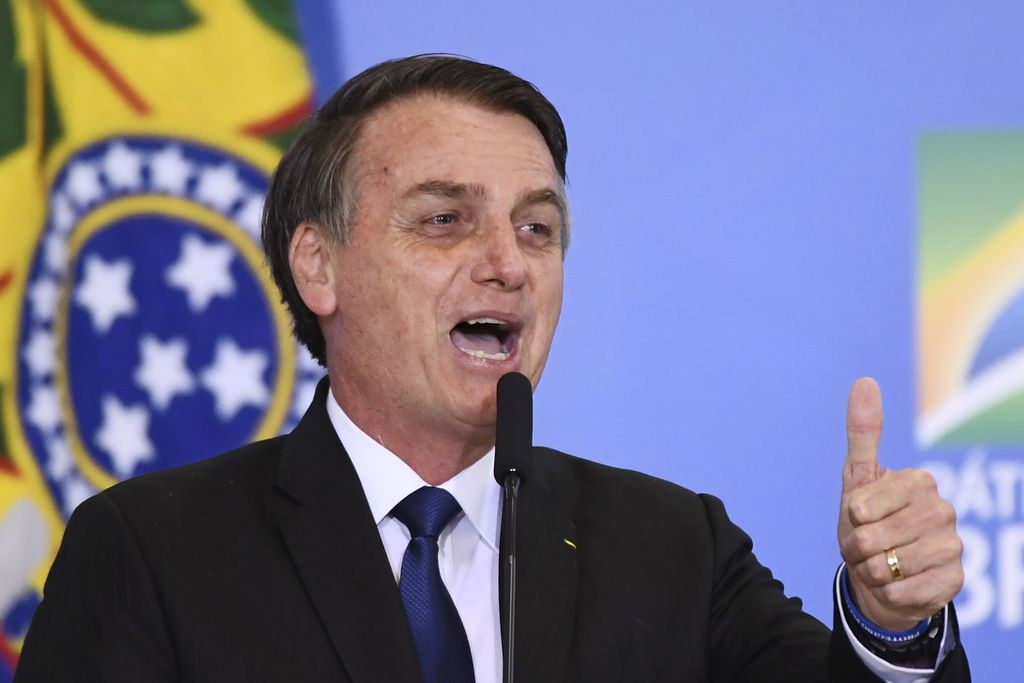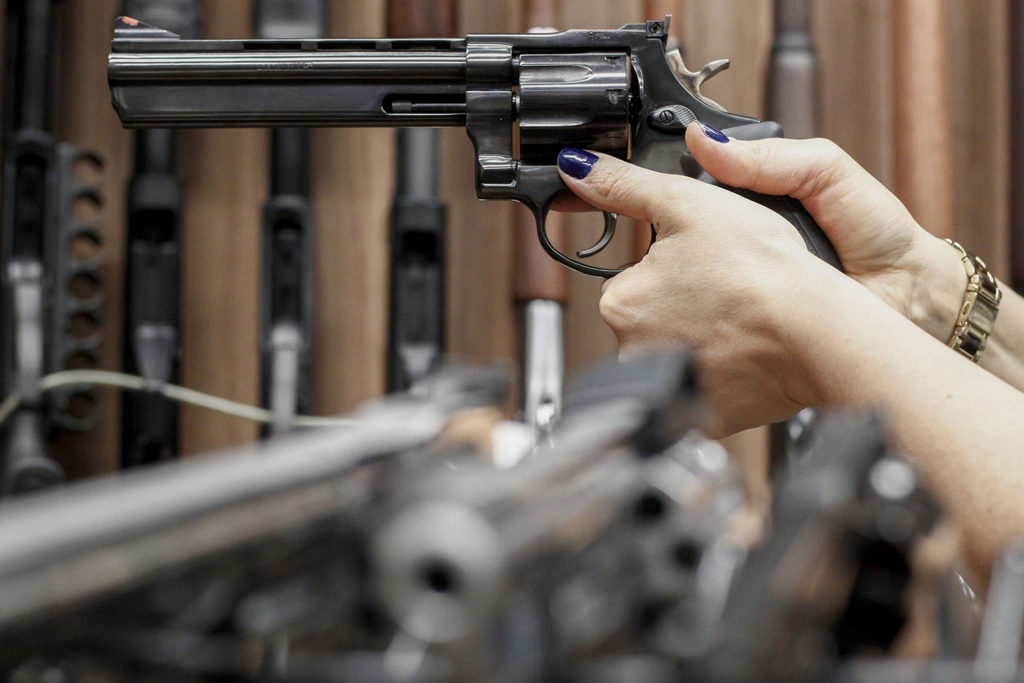RIO DE JANEIRO, BRAZIL – Entrepreneur Diego Brito, 33, leaves the shooting range pleased after 50 shots with his Glock. He practices every week with some of his 12 firearms. His passion and purchases have increased to such an extent over the years that this month he bought three more.
“But don’t think that I left the store with them. I have to wait for all the bureaucracy. I will receive them within at least five months, sometimes it takes up to a year,” he says at the Black Beard shooting club, one of the largest in the state of São Paulo. It is located in Salto de Pirapora, a city that granted President Jair Bolsonaro an overwhelming victory in the 2018 presidential election.
The three purchases “are long guns, 22-caliber, the most pleasant shot,” he says while mimicking the gesture of pulling the trigger as if he were savoring the moment. Brito makes a living manufacturing military knives for special units of the security forces. But he explains that, when facing an attacker, he prefers firearms because “defending yourself with a knife or a hammer is very dirty”. Guns allow one to keep one’s distance. “I don’t need to shoot, just wield it”, he concludes.

Brazilian gun fans are on the rise – and the business is booming – since the retired military officer came to power in 2019. Bolsonaro has already proclaimed in one of his cabinet meetings. “I want the people to arm themselves! It’s the guarantee that no son of a bitch will emerge to impose a dictatorship here! How easy it is to impose a dictatorship!”, he shouted in an intervention that left Brazil baffled and horrified those who perceived a call to organize armed militias faced with unpopular decisions from opponents.
With an avalanche of legislative changes, the far-right has fulfilled its electoral pledge to ease access to guns to its citizens. Brazil, which had a law regarded as a model in arms control, although poorly implemented, passed by Luiz Inácio Lula da Silva at the start of his term, is distancing itself from the European model and drawing closer to the United States.
Sales of pistols, rifles, and the like almost tripled over the past two years. If in the year of his election victory 50,000 new weapons were registered, in 2020 there were 130,000 by October, according to official data. Furthermore, gun registrations have increased, more people can leave home carrying a gun, they can own more pieces, buy more powerful calibers, more ammunition, and now licenses are renewed every ten years, no longer five. The promoters of this shopping frenzy are the citizens who build or expand their arsenal.
This sector boom is noticed at first sight in the shooting club that Newton Ramos Publio, 54, opened six years ago. He is expanding the establishment, which is also a shooting school because business is going very well. Its 16 employees serve 3,000 members – including those dedicated to shooting sports – in facilities in the middle of the countryside, one hundred kilometers from São Paulo. A venue with a bar, store, and several training booths, where last Thursday there were shooters alone, together with friends or couples practicing, most without masks.
The entrepreneur, who defines himself as conservative, moderate right-wing, armamentist, and patriot, campaigned for Bolsonaro and is fascinated with his management in general, not only with the armamentist issue. “I’m only radical with laws and good customs, I won’t tolerate them being violated,” says this ex-head of security at a German multinational that considers the Criminal Code too lenient. His speech revolves around the “good citizen” in a hostile environment.
Publio credits the incredible surge of weapons in the hands of Brazilians to Bolsonaro’s drive, but places it within a chronic problem: “The high crime rates” are, he says, what leads people like his clientele to arm themselves to defend their families and their property. In no other country in the world, wars apart, so many people kill and die violently. Brazil is a huge market of illegal weapons with large territories controlled by powerful organized crime and multiple drug trafficking routes.

Over a million Brazilians are legally armed. Half are state police officers and soldiers, according to data from the Brazilian Public Safety Forum. The set of rules that regulate purchase and possession is excessive. Details abound. Overall, members of the security forces can buy them with less bureaucracy than civilians and receive them within a matter of days.
As for the rest, most are amateur shooters like Brito, who can purchase them, albeit with stricter controls. So they must wait several months to receive their latest weapon; as something new, they can carry their gun from home to the shooting club. And a minority are farmers who own them for personal defense; they are forbidden to carry them out of their properties. Purchasers must undergo a psychological evaluation and have no prior convictions.
The shooting club entrepreneur repeats one of the mantras of gun advocates around the world: “It’s obvious that with more guns, with well-prepared citizens… all of this regulated, the trend is for crime to decrease,” he explains alongside part of his arsenal: an Austrian Glock, two Brazilian Taurus rifles and a Turkish shotgun.
Melina Risso, a public security specialist at the Igarapé Institute, disagrees. She points out that “science shows us that if there are more weapons in circulation, homicides increase”. The specialist suspects that the relaxation promoted by Bolsonaro influenced the fact that, despite the pandemic having emptied the streets, murders increased by six percent in the first semester. “What we need to understand is how much this has influenced things,” explains the researcher.
Bolsonaro, who built his career by advocating the interests of the police and armed forces, has a compact electoral base within this group. With this President, active or reserve military officers have gained great visibility and power through elected and executive positions. At the same time, pro-guns groups are louder. The Igarapé Institute researcher explains that “they are a radical minority” because, according to surveys, two-thirds of Brazilians oppose easier access to pistols or rifles.
Along these lines, the Supreme Court, Congress, and civil society have managed to contain to some extent the efforts of the President – himself a shooting fanatic – to make his country resemble the United States, where the presence of guns is commonplace. “What he (Bolsonaro) is doing by increasing people’s ability to buy guns and ammunition is very dangerous. A radical group is accumulating an arsenal,” which for Risso means “undermining the democratic rule of law”.
Practicing in the Black Beard is free for police and military personnel. A policy that, according to the owner, has nothing to do with public relations. He does it out of social commitment because better-prepared security forces are good for society as a whole. And he recalls that, unlike in the United States and Europe, where police officers spend their spare time resting, taking care of themselves or exercising, many of his Brazilian colleagues work as private security guards to make ends meet. They earn little and don’t have much self-esteem, he says.
The shooting club owner visited the Salto de Pirapora police station a few days ago to bring a gift: two 9-millimeter pistols for two police officers who confronted criminals who wanted to kidnap a resident. Publio is running for mayor in the November municipal elections. He is running on fertile ground for his arms speech because Bolsonaro secured over 70 percent of the city’s votes in the presidential elections.
The presidential signature also enables a 7.62 caliber rifle to be bought in a store since May. It costs around R$14,000 (US$2,600). “We have sold around 650”, explains Clovis Aguiar by telephone, owner of Isa, in São Caetano, the first authorized store. Here there is also a wait to take it. But the first buyers already have the rifle at home.
Source: El País

